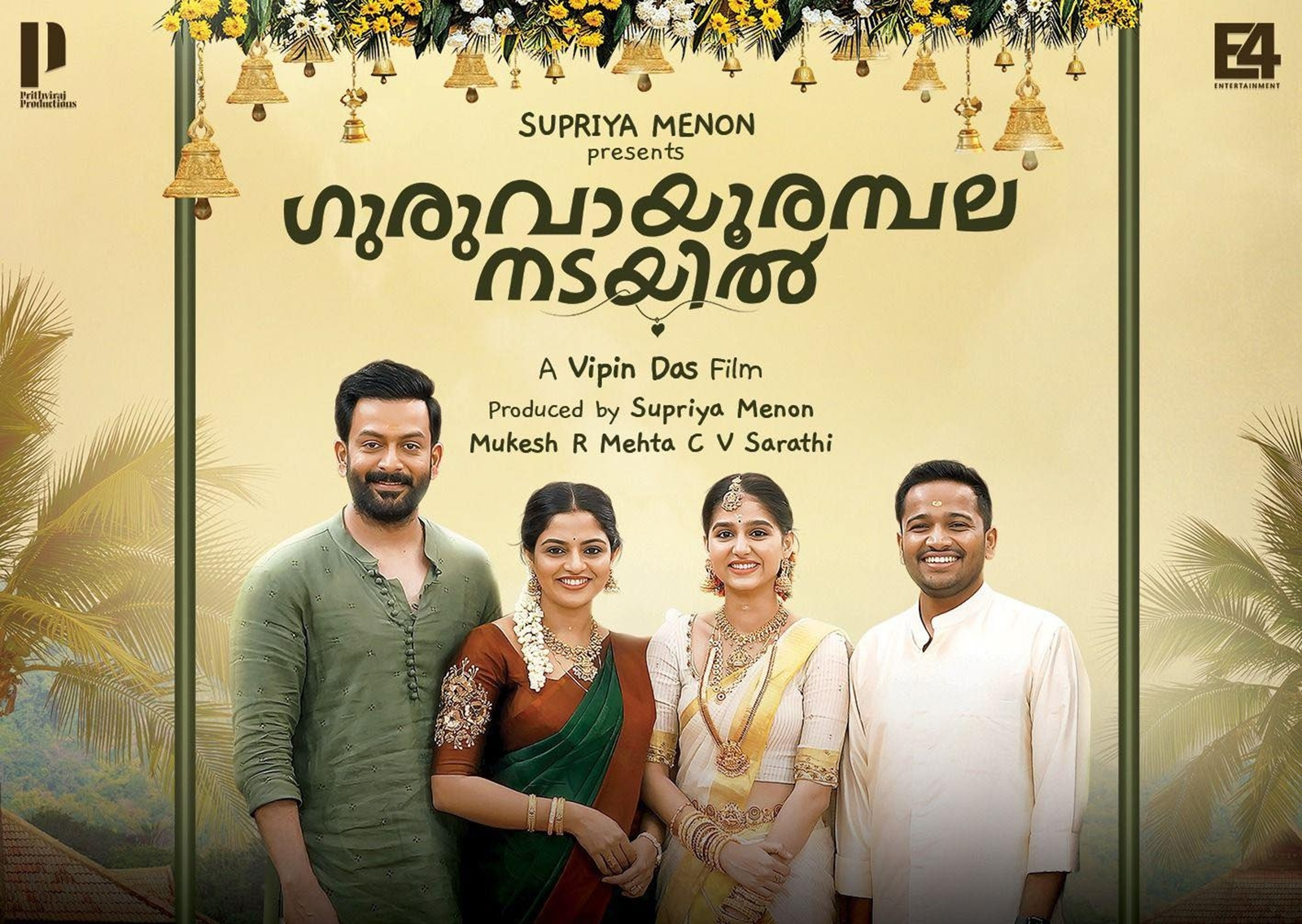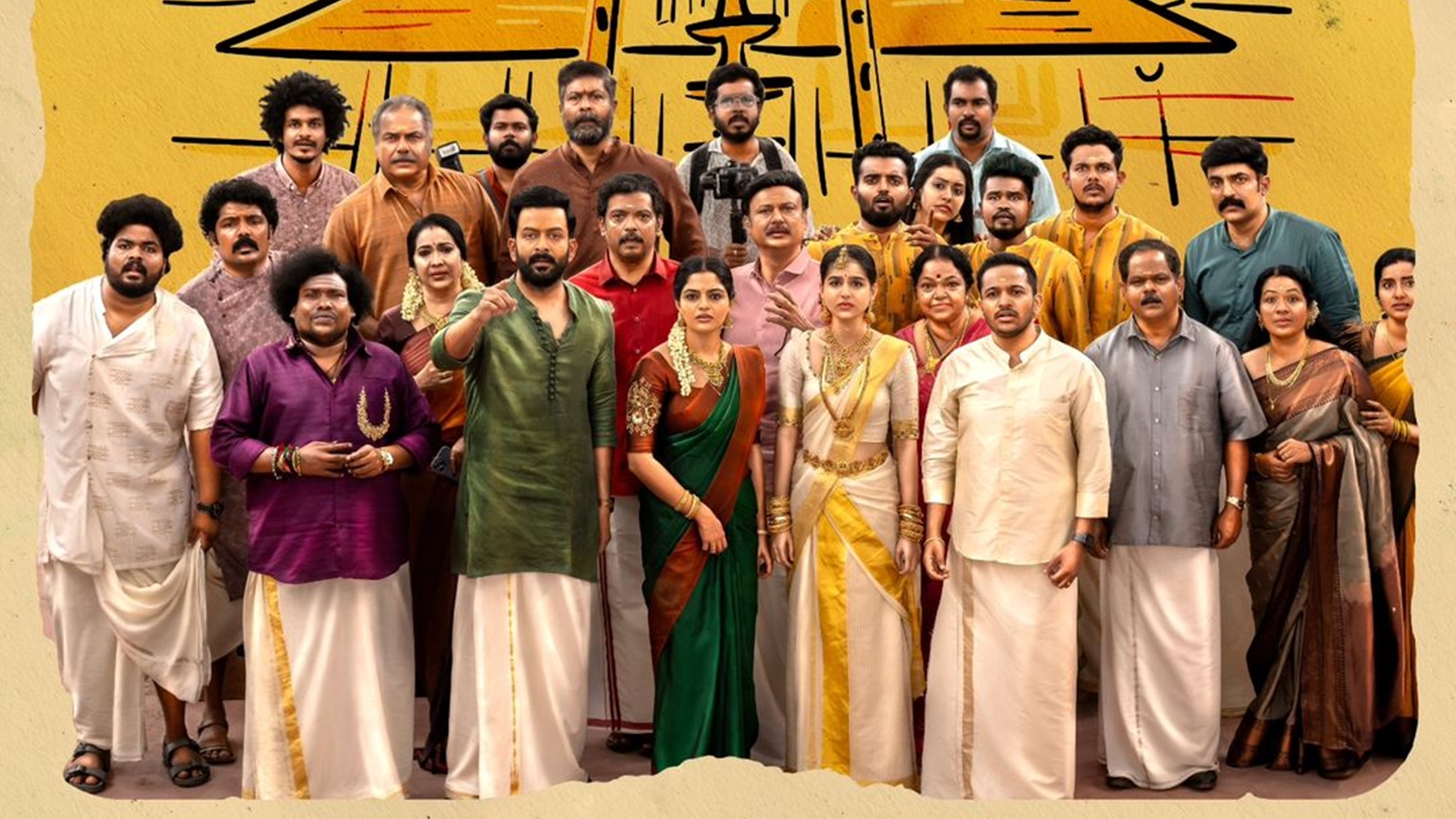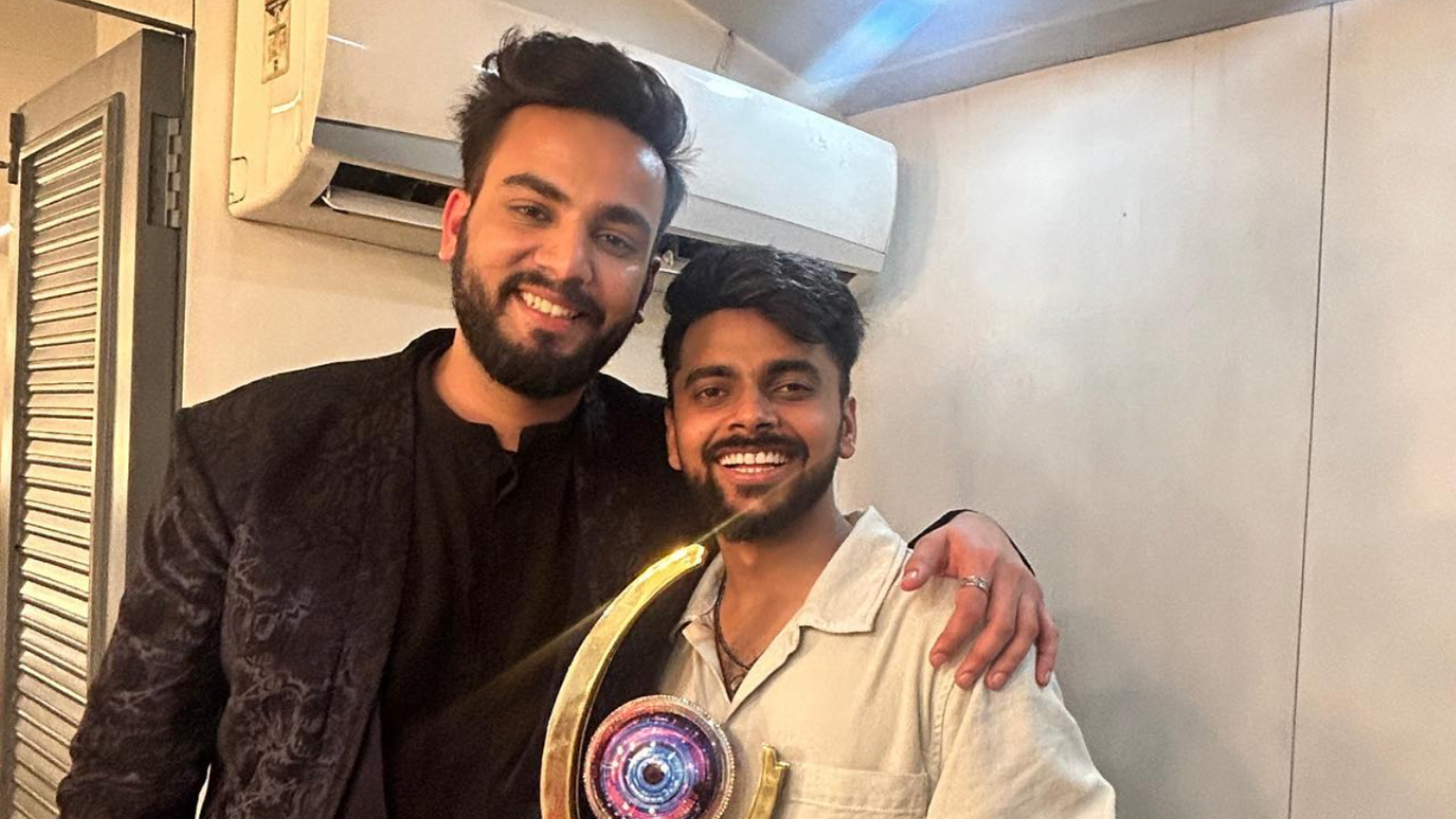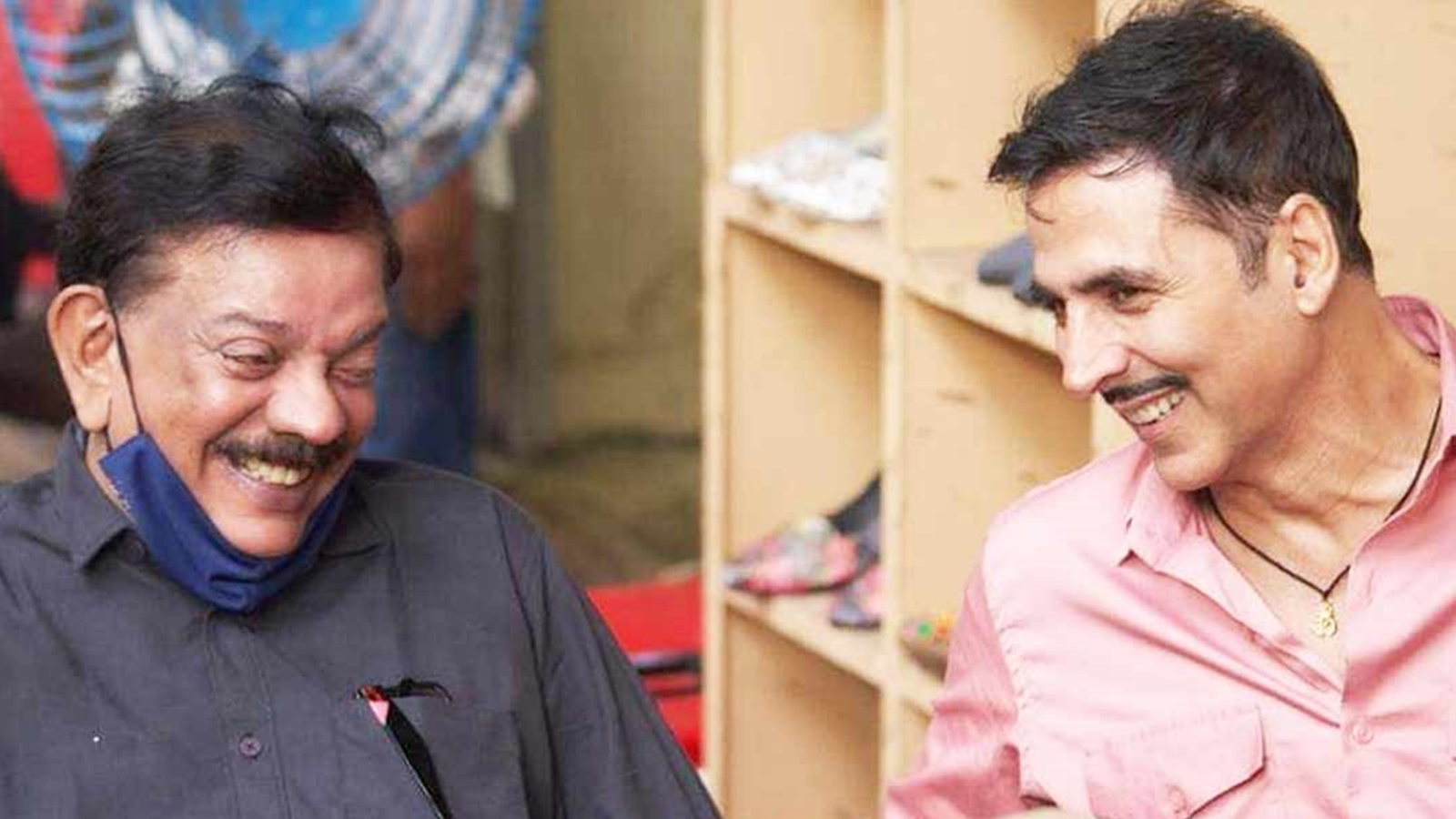[ad_1]
Malayalam cinema’s depiction of the uproarious chaos that could erupt during weddings has often been tear-inducingly funny. While Aniyan Bava Chetan Bava (1995) and Upacharapoorvam Gunda Jayan (2022) confined such moments to their respective climaxes, Thinkalazhcha Nishchayam (2021) showed that an entire movie could revolve around such mayhem. Yet, all of them managed to succeed in this endeavour, primarily because of their relatability. We too must have encountered such weddings wherein things are evidently going out of hand and are just minutes away from turning into a brawl. A similar chaos forms the foundation of director Vipin Das’ Guruvayoor Ambalanadayil and the film also serves as a good example of what a maker can create when they have absolute control over their work, not attempting to bite off more than the movie can chew.
A marriage, especially in India, is often regarded as the union of two families. In many cases, those who are actually getting married have little to no role in the arrangements or the function, besides the registration, rituals and photo sessions. The wedding of Vinu Ramachandran (Basil Joseph) and Anjali (Anaswara Rajan) also reaches such an impasse when all those around them split into two groups: one in favour and the other against the event happening, owing to individual reasons, with the couple’s wishes almost disregarded.
Guruvayoor Ambalanadayil opens by showing Vinu discussing his impending wedding at Guruvayoor Ambalanadayil (at Guruvayoor temple’s entrance) with his colleagues in his Dubai office, and thus the director neatly emphasises where the movie’s focus is, setting the stage for what is about to unfold. It soon reveals that Vinu had a past relationship and that his former girlfriend “dumped him,” something which “hurts” him to this day. But he no longer has anything to worry about as he has finally found someone to share all his sorrows and joys; someone who has vowed to be with him in sickness and in health; and no, it isn’t his fiancée Anjali, but his to-be brother-in-law, Anjali’s sibling, Anand (Prithviraj Sukumaran). The two not only consider each other as the brothers they never had but also share a deeper bond than the ones they have with their significant others.
Their bromance runs so deep that Vinu spends most of his free time talking to Anand, who works in Jamshedpur, over the phone instead of engaging with Anjali, his family or friends. Even during his private conversations with Anjali, Vinu prefers talking about Anand. Despite her irritation, Anjali tolerates it as she has developed a fondness for her fiancé, whom her brother found for her for an arranged marriage.
Watch Guruvayoor Ambalanadayil trailer here:
While Anand aids Vinu in overcoming the “pain” caused by his past relationship, Vinu reciprocates by reuniting Anand with his estranged wife Parvathy (Nikhila Vimal). As a result, Anand undergoes a transformation, shedding his short-tempered nature and evolving into a better man. However, upon reaching Kerala, an unexpected event forces Vinu to contemplate withdrawing from the wedding. Despite his efforts to opt out, Anand, unaware of the incident, proceeds adamantly with the arrangements.
Vinu, however, finally comes to terms with everything after discussing it with Anjali and they both decide to proceed with the marriage. It’s only then that Anand learns about the prior incident that prompted Vinu to reconsider the wedding. Enraged now, Anand attempts to call off the wedding but fails to sway the determined couple and his family. The remainder of Guruvayoor Ambalanadayil unfolds as all their endeavours, both in favour and against the wedding, backfire, escalating the already tumultuous situation into uproarious chaos.
From the outset, Guruvayoor Ambalanadayil keeps everything simple, never attempting to take the narrative or the characters where they don’t belong. Writer Deepu Pradeep’s skill in creating rich environments and layered characters, as seen in Kunjiramayanam (2015) and Perilloor Premier League (2024), proves beneficial here too and he adeptly sets the mood and sheds light on the relationships shared by various characters within initial interactions itself.
While Deepu delves into the bond between Anand and Vinu through simple moments like phone calls, shared drinks and heartfelt conversations, Vipin amplifies these instances with the skilled use of music, particularly old tracks. Despite the characters’ depth and flaws, Deepu refrains from overemphasising the unnecessary that could veer the story into melodrama and maintains a tone that is caricaturishly silly in line with the movie’s overall atmosphere.
 From the outset, Guruvayoorambala Nadayil keeps everything simple, never attempting to take the narrative or the characters where they don’t belong. (Image: Prithviraj/Facebook)
From the outset, Guruvayoorambala Nadayil keeps everything simple, never attempting to take the narrative or the characters where they don’t belong. (Image: Prithviraj/Facebook)
Even the shift in Anand’s demeanour, from jovial to angry, which is only occasionally glimpsed at first as he is mostly accompanied by Vinu who waters down this behaviour of his, doesn’t feel forced as both the writer and director maintain a solid and measured pace throughout. Even when the unforeseen incident occurs and Anand learns of it later, the makers handle the situation with care, ensuring the rhythm is maintained.
Despite the complexity of the script, which involves several key characters undergoing significant changes in their natures, motives and purposes at various junctures, Deepu handles it with precision, ensuring that each aspect is well-developed while also not compromising on extracting maximum comedy from every situation. Vipin’s mastery in amplifying humour from the written word to the visual language, as demonstrated in Jaya Jaya Jaya Jaya Hey (2022), is evident here too and one of Guruvayoorambala Nadayil’s major attractions is undoubtedly his skilful handling of exaggerated comedy, without it feeling cringeworthy. At the same time, besides the use of old tracks, the film also impresses with its integration of pop culture references, particularly from iconic older films such as Drishyam (2013) and Godfather (1991). This achievement is notable since such attempts could easily misfire, even if they appear funny on paper. However, the makers ensure their seamless integration into the narrative, making it all appear fun.
Nevertheless, the most impressive aspect of Guruvayoor Ambalanadayil is the on-screen chemistry between Prithviraj and Basil Joseph. While Vinu and Anand, portrayed with many flaws of masculinity, are presented as almost cartoonish characters, making multiple mistakes and rightfully facing consequences, their attraction to each other becomes clearer in scenes together as they resemble each other in more than one way, and few can tolerate their behaviour and both Prithviraj and Basil excel in their roles. Particularly noteworthy is Prithviraj’s portrayal, especially since comedy isn’t the actor’s forte. Despite this, he exudes absolute charm and handles humour effortlessly, never going overboard, especially in terms of dialogue delivery, a previous weakness.
The stellar performances extend beyond these two to include nearly the entire cast, from Nikhila and Anaswara to Jagadish, Baiju, Kudassanad Kanakam and Siju Sunny. Among them, Nikhila and Anaswara stand out with their layered and controlled performances, depicting characters constrained by the dominance of two patriarchal figures with peanut-sized brains. However, despite their ample screen time, their characters go underexplored, which could have been rectified had the makers shifted some of the spotlight away from Vinu and Anand and provided the women the same and some space to narrate their stories and opinions. At the same time, the narrative also fails to adequately justify Anjali’s strong feelings for Vinu, despite their arranged marriage, prompting her to insist on tying the knot with him despite all the chaos.
Cinema Anatomy | Sai Pallavi: The rightful heir to Anushka Shetty’s throne, as the one who has never been a presence sans a purpose in any film
While Guruvayoor Ambalanadayil steadily builds up to its extravagant climax, where chaos reaches new heights, providing ample opportunities for the makers to showcase their skills, this sequence falls significantly short of the narrative’s buildup. Although the combination of music, action and humour, along with the chaos involving numerous characters, reminiscent of the godown fight in Vettam (2004), is entertaining to watch, Vipin could have improved it significantly. And because of this, Guruvayoor Ambalanadayil might leave at least a few unsatisfied due to its ending, although the Nandanam (2002) Easter eggs manage to bring a smile, despite potentially feeling overused by the end.
Ankit Menon deserves immense praise for his work in the music department, particularly for his skilful crafting of the BGM. By seamlessly placing classic tracks like “Kannamthumbi” and “Azhagiya Laila” and his original compositions in Guruvayoor Ambalanadayil’s background, Ankit elevates the mood significantly, ensuring a beautiful viewing experience. While Neeraj Revi’s cinematography is decent, albeit lacking at times, editor Johnkutty impressively compensates for this shortfall on several occasions. Action director Felix Fukuyoshi Ruwwe also merits commendation, particularly for his execution of Guruvayoorambala Nadayil’s climactic fight scene. Arun S Mani’s sound design, Sunil Kumaran’s art direction, Aswathy Jayakumar’s costume design and Sudhi Surendran’s makeup deserve recognition for their exemplary contributions.
Guruvayoor Ambalanadayil movie cast: Prithviraj Sukumaran, Basil Joseph, Nikhila Vimal, Anaswara Rajan
Guruvayoor Ambalanadayil movie director: Vipin Das
Guruvayoor Ambalanadayil movie rating: 3.5 stars
[ad_2]
Source link





